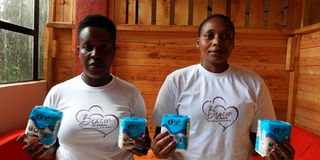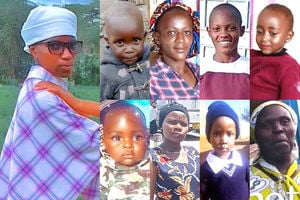Call to set up sanitary pad dispensers in schools

Beacon of Hearts director Gertrude Chepkemoi (left) and secretary Miriam Chelangat display packs of the sanitary towels in Bomet County on June 7, 2023. The community-based organisation is pushing for the setting up of free sanitary pads dispensers in schools to dignify menstruation.
What you need to know:
- The government has been providing male condoms in health facilities, bars, nightclubs, lodgings and other public places.
- Beacons of Hearts, a CBO based in Bomet, wants a similar programme rolled out in all public schools.
Spurred by their humble backgrounds and challenges encountered as teenagers, two women have come together to rally donors and well-wishers to provide sanitary towels to schoolgirls to promote learning and dignify menstruation.
Ms Gertrude Chepkemoi and Ms Miriam Chelangat are the brains behind Beacons of Hearts, a community-based organisation (CBO) in Bomet County pushing the government to set up sanitary pads dispensers in schools.
Lack of sanitary towels has seen many girls skip classes during their menstrual cycles. Some have been sexually exploited in exchange for money to buy pads, while others have been impregnated.
Hundreds of learners have dropped out of school altogether after being shamed, especially by boys when they soil their clothes and have nowhere to clean up or access pads.
The government has been providing male condoms in health facilities, bars, nightclubs, lodgings and other public places, and the two youthful activists want a similar programme rolled out by the ministries of Health and Education in learning institutions.
Beacons of Hope was initiated in 2018 with a visit to Kipngosos Special school in Sotik, where well-wishers donated foodstuffs and clothes to children living with disabilities.
“The success of that first engagement motivated me to bring on board 18 other like-minded youth to mobilise resources in what saw us visit Ndanai Small School for the physically challenged three months later,” Ms Chepkemoi, who initiated the programme, said in an interview.
“It dawned on us that the children required a lot of mentorship to surmount the challenges they were faced with in their lives.”
A mentorship programme, donation of sanitary towels and tree planting programmes in schools was then conceptualised in 2019, following a visit to Burgei Secondary School in Manaret, where girls highlighted menstruation-related challenges.
“We gave the learners sheets of papers to write down the challenges they face in school and it strongly emerged that menstrual hygiene was a matter that needed immediate attention to retain girls in schools,” Ms Chepkemoi stated.
Performance affected
Many girls, it emerged, were missing classes whenever they were menstruating as they lacked sanitary towels. As a result, they dismally performed in their studies compared with boys, who did not skip classes.
“Biting poverty levels at the family level made it impossible for parents to provide the sanitary pads to their daughters and it had become the norm for the girls to miss classes for at least three days whenever they are menstruating, to avoid being shamed when they soil their clothes,” Ms Chepkemoi revealed.
The menstrual hygiene programme was launched, with the initial beneficiaries being learners from Sigorian, Kiricha, Kamureito, Kimawit, Chebirbelek, Kamungei, Embomos, Kiplobotwo, Kapcholio, Kapchepkoro, Mosop Mission, Our Lady of Victory Girls’ Kapnyaberai, Chelemei, Sasita, Sugurusiek, Mengit primary and secondary schools in Bomet County.
The programme has since been rolled out to Kericho, Uasin Gishu and Nakuru counties, with a plan to expand it to other neighbouring counties.
“Giving back to society is not always about what you have in excess but what one can mobilise from others for use by those in need,” Ms Chepkemoi said.
Most of the girls, for lack of exposure and the fact that they are shy, cannot face their teachers and tell them to provide the pads when they suddenly experience menstruation while in school. Matters have been made worse by the fact that the number of women teachers in the learning institution is low, with the majority being men.
“It is unfortunate that at this time and age, we can only find free condoms in public spaces, yet there are no free sanitary towels for girls and women in learning institutions,” Ms Chepkemoi said.
“We have all along in the course of mobilising resources for the girls in schools, encountered young mothers beseeching us to consider them for donation of sanitary pads as they cannot afford to buy it.”
The high number of teenage pregnancies has also been attributed to lack of sanitary towels, as most of the victims are exploited by men who lure them into sex in exchange for money to buy the pads.
Ms Chelangat urged the government to provide the towels in all schools and public places alongside the condoms to dignify menstruation.
“It is unfortunate that there is discrimination in the supply of free pads to schoolgirls by the government, with some of the institutions getting supplies that could last for five years while others have none,” Ms Chelangat said.
She noted that despite the high number of successful women in various spheres of society, they were not involved in the push to uplift the hygiene and social challenges girls face, especially in the rural areas.
“Those living in urban centres have an advantage over the girls in rural areas due to exposure and access levels to sanitary facilities. The girls in rural areas have been forced to use their tattered clothes as sanitary pads,” she said.
“Women politicians and those in policymaking levels in government and private institutions should focus on bailing out girls during their menstruation circle. It is a matter that needs a lot of attention in the society,” Ms Chelangat said.
Ms Chepkemoi and Ms Chelangat said providing the free sanitary dispensers in schools would enable girls on their menses to clean up and return to class.
Period shaming
In 2019, a class six pupil died by suicide at Kabiangek Primary School in Bomet County after allegedly being shamed in class for soiling her dress as she suddenly experienced menstruation. A female teacher said to have failed to assist the girl was transferred from the school following a public outcry.
Beacons of Hearts is also pushing for the cost of the sanitary towels to be reduced. “On average, the cost of a pack of pads is Sh50, which is beyond the affordability of the rural folks, especially with the hard economic times facing the country. We are proposing it be reduced to between Sh10 and Sh20 to ease access,” Ms Chepkemoi says.
On May 27, a day before the International Menstrual Day, the CBO organised a public event at Kipngosos Primary School, where 600 girls from five learning institutions got sanitary towels.
The successful mentorship programme, presided over by Postal Corporation of Kenya Chief Executive Officer John Tonui and Rongena Manaret ward representative Rosaline Cheptoo received the support of various institutions and individuals.
Others who rallied behind the girl child included Principal Secretary Aurelia Rono, Ms Rael Jebichii, Bomet Deputy Governor Shadrack Rotich, Sotik MP Francis Sigei, Bomet County Assembly speaker Cosmas Korir, and Wakili Kemboi Foundation. The county executive and legislature also support the initiative.
As a result of these interventions, the narrative on the menstrual cycle is slowly changing from that of shame to acceptance and dignity.





